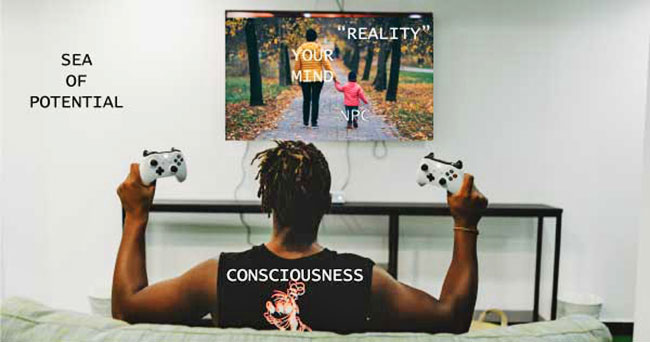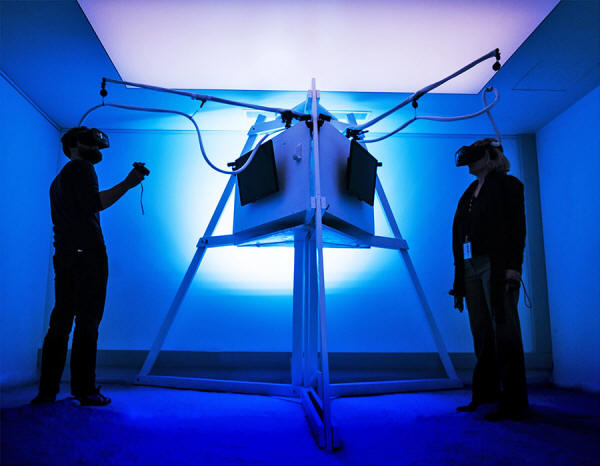|

by Shelly Fagan
September
22, 2019
from
Medium Website

Photo by Sabine Peters on Unsplash
If reality is
a computer simulation, how does that work?
In 2003, Swedish philosopher
Nick Bostrum proposed that the
universe may be a simulated reality - an enormous game of Sims.
This virtual universe
may have been created by our future generations who wanted to
time travel to the past but
eliminate the inherent paradoxes.
In this scenario, you
could kill your great grandfather and not destroy your own chance to
be born.
Bostrum suggested that if a civilization developed advanced
technology that could create such a virtual world, the inhabitants
would probably create multiple copies.
If our descendants managed to achieve this, Bostrum argued, then the
odds were that you are one of many copies living in a simulation
rather than the base reality.
Statistically speaking,
if there are 10,000 simulated universes where copies of you exist,
the chances of your consciousness being the original would be 1 in
10,000.
In other words, if copies were made, and the odds are you are not
the original.
A Universal
Web of Simulated Realities
Think of it as a vast Internet where each individual page represents
one possible reality simulating the past. Or, this world may have
been designed based on nothing more than someone's imagination.
Infinite universes may exist where every possible choice can play
out.
Your consciousness may be
experiencing an existence like a choose-your-own-adventure book.
Another possibility may be that we are willing participants, opting
to immerse ourselves in the experience by forgetting our true
nature. We may suspend our understanding of reality to accept a
limited view of the universe.
It should be noted that some other scientists reject this theory.
Do We Have
Free Will?
The ancestor simulation hypothesis falls apart when it comes
to consciousness.
If we are merely props in
our descendant's playground, and our actions are predetermined, then
there is no need for us to have
free will. It would serve no
purpose to grant the inhabitants any sort of agency if they are not
free to make choices.
It would require vast
amounts of computing power for an unusable feature - and one that
would likely disrupt the simulation.
The exception would be if consciousness was granted to those
intended to experience the simulated reality and the main character
had limited free will.
In other words, this
universe was designed for your experience alone and therefore,
only you are conscious inside your virtual world.
You have some ability to
make decisions and move about with some limitations...
If We are
Living in a Giant Computer Game, what would that Look Like?

A simulated reality might function something like the above image.
Your consciousness exists
in a vast sea of potential. It would be much like an individual
sitting in a living room deciding to play a game.
Your consciousness has any number of adventures to choose from, and
many possible experiences. Until a game is chosen, it is only a
"potential" reality, just like a book on your bookshelf has the
potential to be read. It exists much like a wave form.
As we experience it
inside the simulation, it becomes "particle-like" and "real." Our
physical form is like our avatar inside the game.
We have freedom of
movement if we hit the major checkpoints such as,
marriage, career,
children, etc.,
...much like a video game
requires players reach certain locations or achieve goals before
moving forward.
We are limited by the
constraints of the adventure, we cannot defy the built-in laws.
While others share the same construct, they are non-player
characters in your game, you are an
NPC in their experience. Your
universe was designed for you, only you are conscious in your
reality, but everyone's adventure plays out in the shared space.
Our stories may
overlap, but they are independent, separate, and distinct.
Reality is purely subjective to each player.
Our mind is where our
reality is created.
We simulate the
physical world inside our brains using our perception of the
world.
The only difference is
that in this reality, we are conscious (or we have simulated
consciousness) and we are unaware we are in a simulation or the vast
expanse of potential.
Even if everything is simulation, the world "out there" seems
real to us (read below article)...
What is "Real"?
by Shelly
Fagan
September 11, 2019
from
Medium Website

Photo by Alexander Andrews on Unsplash
You are out of touch with what is reality.
We think everything we experience is "real." We believe
something exists when we can touch or see it like nature,
technology, and other people.
In this view, reality
is shared. It is an environment we move through which is
separate and distinct from us. Experiences which have the
potential to change our definition of reality must be validated
by others.
If we see a flaming
meteor streaking across the night sky, invariably we will turn
to others and ask,
"Did you see
that...?"
Not only are we
calling attention to something unusual, but we want outside
verification of what we experienced.
Can someone else validate our reality, please?
Objective
Reality

Photo by Phil Coffman on Unsplash
If others agree with our view, that consensus makes it fact.
"Yes, I saw that
flaming rock flying overhead," therefore, it happened, and
it is real.
If enough people
agree, it becomes unassailable truth.
Facts are what is meant by "objective" reality. It means
something exists independent of our opinions on the matter. It
is unbiased and not subject to interpretation. It just is.
This causes a great deal of problems when not everyone agrees.
Reality and
Religion

Photo by Nathan Anderson on Unsplash
If everyone in the town believes the meteor is a sign of God's
favor, then we accept that as true.
It moves from a
subjective belief based on faith and becomes our objective
reality. We don't acknowledge the possibility for error or allow
for ambiguity.
We "know" we have the ultimate truth. We remain steadfast in our
position that we are right because everyone else agrees.
One lone voice says it is a space rock from the outer edges of
the solar system and has nothing to do with God or signs from
the heavens.
Their scientific view
will be labeled dangerous, kooky, and ultimately, they will be
silenced. Usually, this comes in extreme forms of censure or
even death.
This dynamic occurs not because the scientist is wrong, but
because they went against the popular view of the world.
Reality is
a Numbers Game

Photo by Paul Bergmeir on Unsplash
There is power in numbers, even if everyone is wrong.
If you side with the scientist, you risk being labeled mentally
ill, incarcerated and forcibly medicated. This diagnosis may
result in all sorts of problems for an individual to move
through society.
Popular opinion has
the power to destroy your future. Ironically, it might be said
one would have to be crazy to speak up considering the potential
consequences.
As one example, many philosophers reject the notion of
solipsism, that is the belief that one cannot know anything
outside one's own mind.
Basically, the
assertion is that reality is wholly subjective and therefore,
nothing matters.
Metaphysical solipsism is the idea that everything outside of
the self is an illusion, and that reality exists only for the
individual. The trouble with this notion is that some believe
this excuses people from ethical behavior, ignoring the
possibility that we may personally benefit from our good actions
toward others.
In turn, this opens
the door to moral relativism as one's experience is the only
thing that is real.
Because of this, the philosophy is largely rejected in academic
circles. It is often ridiculed.
Mental health professionals view this sort of personal
philosophy as a pathology, calling it "Solipsism Syndrome" -
although it is not yet officially recognized as a disorder.
In the future, your belief that you cannot know anything to be
real outside yourself, and that your observation is the only
objective reality, could result in you being labeled mentally
ill.
You risk losing your
rights to move freely in society, to hold certain jobs, or to
live without being forcibly medicated.
Life Does
Not Happen to You

Photo by Monica Silva on Unsplash
Despite what philosophers and psychologists say, your reality is
unique to you and your perception is purely subjective.
We don't acknowledge
that another's perception might be different than our own
because it challenges our consensus-building view of the
universe.
Reality isn't a shared external environment you are moving
through along with everyone else, but this is how we expect it
to work.
According to the MIT Technology Review, an experiment by
physicists from Heriot-Watt University demonstrated two people
can observe the same event and see two different things happen.
Both observers would
be correct.
While some will argue phenomenon at the quantum level is largely
irrelevant to the operation of day-to-day existence, it
demonstrates how we selectively choose what information we
incorporate into our version of reality.
We don't reject it because we feel it is invalid, but because it
challenges our reality and requires that we reexamine our
worldview. It is easier to accept our erroneous views than to
make allowances for an evolving reality.
You Do Not
Recognize Your View of Reality is Wrong

Photo by Stella Jacob on Unsplash
According to George Mobus, Professor Emeritus at the
University of Washington, the answer is simple.
In his paper, A
Theory of Sapience: Using Systems Science to Understand the
Nature of Wisdom and the Mind, he demonstrates that most people
frequently do not even recognize their own mistakes, let alone
be able to learn from them.
Whether you acknowledge your flawed perceptions or not, what you
experience is unique to you. It evolves over your life and it
will die at your death.
Others don't agree
with your view of the universe because they perceive a separate
reality. Someone else may experience something completely
different. Both can be correct and still not reach an agreement
regarding what is real.
Yet both will argue
when challenged because they need assurances that they are
right.
While you and others may share many of the elements of your
reality, this does not make your view of the universe objective.
It simply means you agree in your subjective view of the world.
| 








